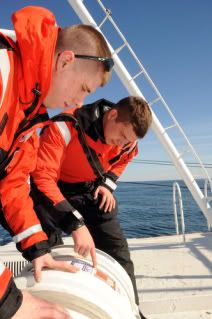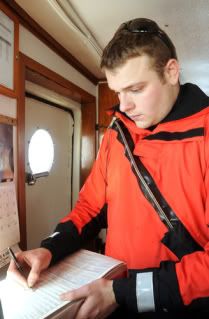Story and Photos by Petty Officer 3rd Class Jonathan Lindberg
CAPE MAY– The last man climbs over the rail of the fishing boat and with a swift leap he lands with his feet firmly planted on the deck to join the other three members of his team. Dressed in orange and black survival suits, they make their presence known. They quickly get to work by talking to the crew and checking the fishing and safety gear. Each man is focusing on their part and moving throughout the creaky boat with a sense of purpose.
This is just the first of many at-sea inspections that will be conducted by the members of the Coast Guard Cutter Vigorous’ boarding teams during their patrol. They are just one part of a bigger mission the Coast Guard is continuing to conduct along the coastlines of the Central Atlantic states until April 30, 2010 in support of the cold weather fishing season. It is called Operation Safe Catch.
Operation Safe Catch has a couple different aspects to it. One is the shore side aspect which includes local safety seminars geared towards fishermen and having Coast Guard commercial fishing vessel examiners that perform dockside exams and issue vessel inspection decals. The other aspect is the at-sea law enforcement.
The Coast Guard Cutter Vigorous, homeported in Cape May, N.J., and its crew is part of the operation’s at-sea side and is on patrol enforcing the commercial fisheries laws and regulations and performing safety inspections of the commercial fishing fleet off the coast of New Jersey.
The at-sea boarding teams are led by a boarding officer. He or she is in charge of how the inspection is conducted as well as the safety for the other members in their team.

“The boarding officer is the one who is leading the boarding team to make sure they are directing their efforts appropriately,” says Lt. j.g. Christopher O’Meara, a crewmember aboard the Vigorous and a boarding officer of 18 months. “For an inspection on a fishing vessel the team has to check the fishing gear, properly identify safety hazards and the different fish species and verify their quantities.”
These boardings act as a two-way street of information sharing. Not only is the Coast Guard team sharing information to the fishing boat crew regarding fishery law and regulation, but the fishing boat crew gives feedback on how the laws affect their fishing efforts.
“They can tell you whether or not certain policies are beneficial,” says O’Meara. “We take that information in and send it to Coast Guard commands to let them know how current policies are affecting the fishing fleet and if there is anything to consider.”
The two main purposes for conducting the at-sea boarding are the safety and stability of the fishing fleet and the protection of the living marine resources.
The safety and stability is monitored by checks the Coast Guard team makes on the fishing boat’s safety equipment including survival suits, life rafts and Emergency Positioning Indicating Radio Beacons and also the importance of hull condition, maintenance of critical machinery and equipment, vessel stability, and watertight integrity.
These safety checks can be made before the fishing boat leaves the dock by a Coast Guard commercial fishing vessel examiner at no charge to the fisherman by having a voluntary, no-fault Commercial Fishing Vessel Safety Exam. This exam reduces the amount of items the Coast Guard at-sea teams inspect on the fishing boat.
“When they get that dockside examination done and then we conduct the boarding, we just check the major safety things and it eliminates some of the items checked because we know they had a dockside exam completed,” says Petty Officer 1st Class Stephen Miller, who has been a boarding officer on the Vigorous for 6 months. “The exams are not required but, the Coast Guard highly recommends it.”
When the dockside inspection is complete the Coast Guard inspector will issue an inspection decal showing that the vessel has completed a satisfactory vessel dockside examination and was found to be in full compliance with all applicable federal commercial fishing vessel safety regulations. The decal is valid for a period of one year from the date of issue.
“By a fisherman choosing to go through with a voluntary dockside exam and as long as the inspection decal is current we go aboard and check one or two things to verify the gear is still good,” says O’Meara. “It saves us time and saves him time but most importantly it gives him the peace of mind before he even leaves the dock his boat is in good shape.”

In preparation for Vigorous’ Northeast fisheries patrol the command has sent some of its members to specialized training centers.
“We’ve sent four people to the Northeast Regional Fishery Training Center located in Cape Cod, Mass.,” says Cmdr. Brendan McPherson, commanding officer of the Vigorous and a native of Bradley Beach, N.J. “That provides them with the training and experience of conducting living marine resource enforcement. That includes both checking safety equipment to examining the different species and what are the right rules and regulations.”
Since March 1, 2010 was the opening of the scallop season there is an added importance of the presence of the Vigorous and its crew needed to enforce fishing laws and regulations.
“We’re seeing a lot of scallop boats out here,” says McPherson. “Our job will be to get aboard and make sure whatever fisheries they are involved in are being conducted in accordance with the rules and regulations. That helps protect that fish species so there is future opportunities for that species in the region.”
To carry out these at-sea boardings the Vigorous and its crew uses different resources aboard the cutter as well as Coast Guard support from land.
“We use different tools that are at our disposal including our helicopter aboard, air support from Coast Guard Air Station Atlantic City, N.J., and even air support from Coast Guard Air Stations all the way north as Cape Cod and as far south as Elizabeth City, N.C.,” says McPherson.
These aircraft are used to survey the fishing areas.
“That helps us determine where the fishing fleet is and what they are fishing for,” says McPherson. “Then we will go out and come in contact with the fishermen in that area and make a determination of a boarding by need.”
McPherson says there are some factors taken into consideration to determine whether or not a fishing boat is boarded.
“It comes down to the weather conditions, what vessels you have available, when the last time is they have been boarded and the likely hood there may be an issue with their safety or the fisheries that are being conducted,” says McPherson.
Another item that is one of the determining factors is the inspection decal the fishing boat may have if the captain chooses to have a Coast Guard dockside Commercial Fishing Vessel Safety Exam.
“One thing we look for is if they have the vessel inspection decal,” says McPherson. “If they have the decal and it was just issued we have the assurance the vessel is safe. If I have another vessel that doesn’t have that decal I don’t have those same assurances. Given the choice between the two I’m probably going to board the vessel that doesn’t have the decal.”
These at-sea boardings and dockside inspections stress the importance of safety and how it can affect the fishing fleet.
“Having the dockside exam and maintaining the integrity of the inspection is the most important thing that is going to preserve the fishing fleet,” says O’Meara. “The ship’s stability is one of the most important aspects of the survivability of the fishing fleet.”
O’Meara mentions how the stability of the fishing fleet impacts the fishing community.
“We have a substantial fishing fleet in Cape May and we have had losses of life this past year in the fishing industry,” says O’Meara. “I think that highlights the importance of the fishing and safety gear. It is a tight knit community and it affects everyone when you lose a shipmate.”
A reality that has to do with one of Coast Guard’s primary and oldest missions: The protection and safety of lives at sea.
The dockside and at-sea boardings are a way the Coast Guard is able to carry that mission out on the high seas and ensure the fishing fleet is safe and fishermen have resources they need to carry out their dangerous job.
“That’s what Operation Safe Catch is about, identifying potential hazards, removing them and increasing the knowledge of the fishermen,” says McPherson.








